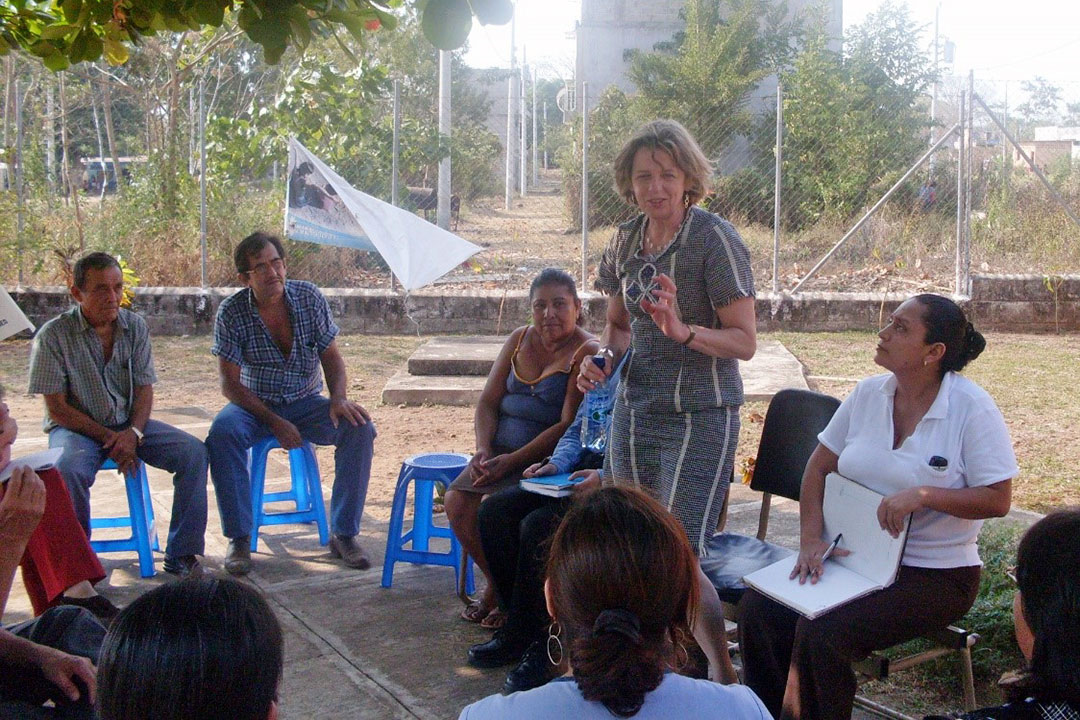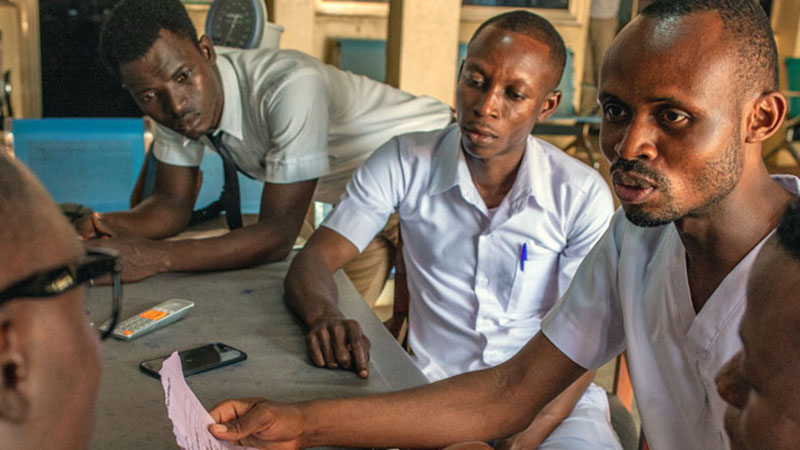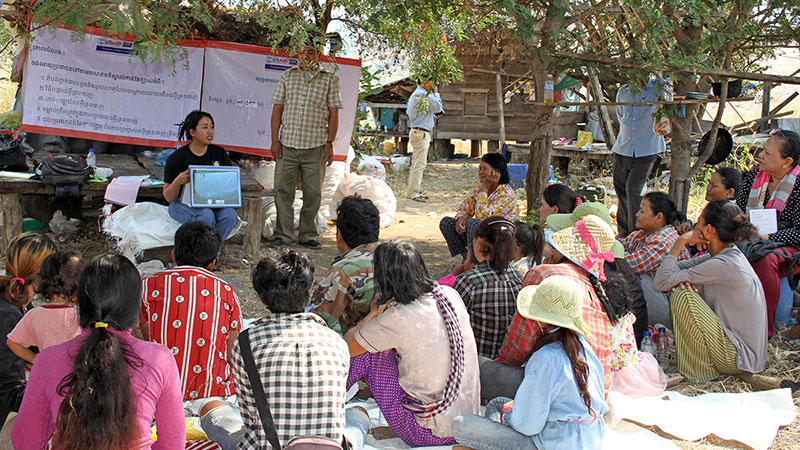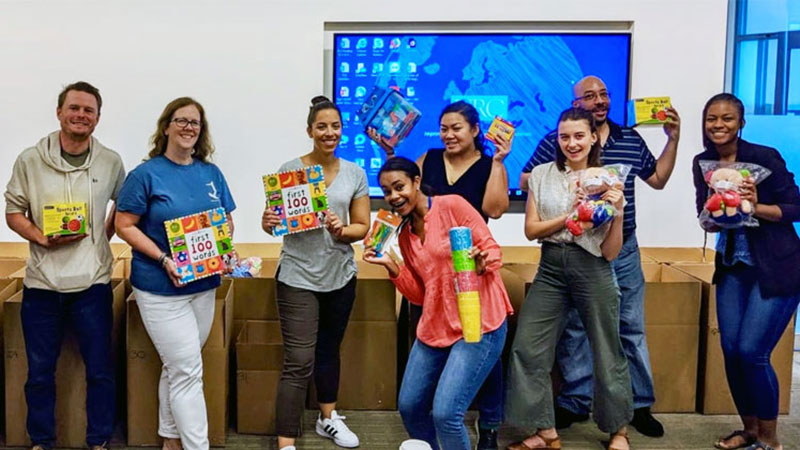Tisna Veldhuijzen van Zanten, Ph.D., URC’s Chief Science Officer and Senior Vice President for International Development, will retire in September after a 30-year career at URC. Recently, Tisna took time to offer some thoughts and insights on her vast experience in providing technical leadership for health systems strengthening and global education programs.
How did you get started in international development?
I began my career in development as part of a UN Habitat program legalizing land ownership and improving infrastructure in impoverished areas of rural towns in Burkina Faso, then known as Upper Volta. It was my first opportunity to have close contact with families and communities in a developing country and see first-hand the challenges they faced.
This got me more interested in the interrelation between economic factors and the well-being of women and children. The work led me to prepare my doctoral dissertation on the effects of migration of men from rural communities in Burkina Faso to work in the cities and plantations in neighboring Ivory Coast. I spent the next year interacting with members of these geographically splintered families. The daily interactions with women trying to care for their families inspired me to consider how development programs could make a real difference for them.
What was your first position at URC?
I started work as a consultant for URC while living in Niger in 1988. I carried out a year-long applied research study for URC’s Primary Health Care Operations Research (PRICOR) Project. This involved looking at the impact village health workers had in contributing to health care coverage for people living far from formal health facilities. Even though village health workers served a critical function in the provision of primary health care, a lack of adequate remuneration even now remains a major stumbling block to sustainable community health programs.
The work in Niger taught me a key lesson. When a structured way to turn research findings into policy changes is absent or ill defined, applied research on its own would not lead to actually creating the recommended changes in health programming.
What do you see as the key factors for successful development projects?
There are many, but here are a few key factors.
Acknowledge local expertise and work to improve it. You can strengthen organizations by starting with quality improvement approaches and instilling a culture of consistent improvement. Show respect for local knowledge. Sometimes teams involved in health care services just need you to ask the right questions to stimulate their thinking and creativity. I believe that if you encourage collaboration and expect excellence, good work will follow. People working together can plot their own destinies.
Empower people to own their own outcomes. Development is about expanding the knowledge and effectiveness of people in their workplace and communities. The timelines of many projects are often so short. The only really sustainable solutions are those that people develop themselves. Development work is about focusing on how people can sustain the gains that have been achieved and continue to build on that.
What are you proudest of amongst your many accomplishments and successes at URC?
I helped create high-performing teams of people from all over the world and think I have been largely successful in bringing out the best in each person. Also, I created opportunities to have colleagues from one part of URC’s “diaspora” bring their knowledge and skills to programs elsewhere.
A guiding principle throughout my career has been my strong belief in helping people work together in a mutually supportive environment. While every country and culture is different, I do believe it is possible to break down traditional hierarchies and provide opportunities for all staff to contribute. The key to achieving results is respecting everyone’s contributions.
For example, a number of years ago, when starting up a project in Benin, I insisted that everyone on the project – from the chief of party to the drivers – call each other by their first names. This was part of an effort to create a team mentality among the project staff and break down hierarchies. Years later, the drivers told me that it was the first time anyone truly recognized them as part of the team.
Another way I have tried to do this is by not judging people by the positions they have and instead looking at their talents and ideas. Too often, organizations promote staff based on time served instead of the value they bring to a project.
What is your advice for people who are just beginning their careers in international development?
Develop your communication skills. This might involve learning another language or getting facilitation training and learning how to be a better interviewer. Being able to communicate clearly with many different types of people will help you do a better job in whatever niche you occupy.
The higher the level you work at the more important it is to recognize that a big part of your success is making other people successful.
Be a life-long learner. Find out what others are doing well and learn from them. If you don’t stay curious, you will not grow. As my responsibilities at URC grew, I learned a tremendous amount by diving in and learning as I went. I even developed a passion for budgeting. You can’t be afraid to make mistakes, they’re going to happen, but you can learn to avoid repeating them.
Keep up with technology. When I began my career in Niger, we used stencils to reproduce interview questionnaires. Thirty years later, we collect data by smartphones. Stay current on innovations.
Value and maintain the friendships you develop with people around the world. Working internationally is an amazing privilege and you never know when your paths will cross again.



